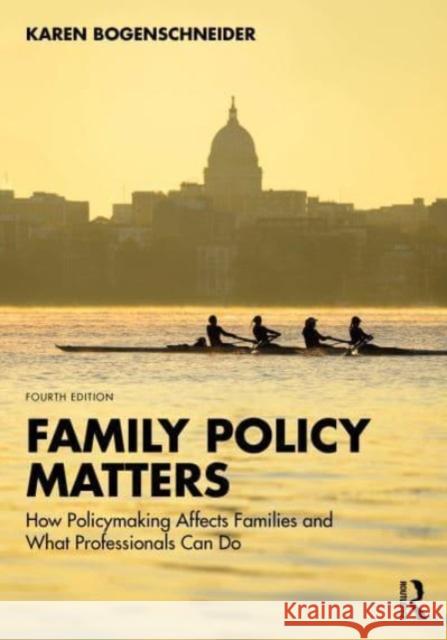Family Policy Matters » książka



Family Policy Matters
ISBN-13: 9781032318325 / Miękka / 2024 / 392 str.
Family Policy Matters
ISBN-13: 9781032318325 / Miękka / 2024 / 392 str.
(netto: 412,38 VAT: 5%)
Najniższa cena z 30 dni: 377,75
ok. 16-18 dni roboczych.
Darmowa dostawa!
This new edition captures the evolving, post-pandemic landscape of family policy—the transformational changes that have occurred within contemporary families and the social, economic, and racial/ethnic disparities that have grown across families.
"This fourth edition of Family Policy Matters is another cutting-edge contribution to the field—accessible, positive and practical, and particularly necessary in light of the crises families have faced since 2014. For years now, whenever asked for expertise on how to take family policy research to policy, KB is the name that comes up first – and so it’s fantastic to have so much of her evidence, experience and guidance in one place. A must-have for anyone in the field who has ambitions to engage effectively with policymakers."
Dominic Richardson, Director of the Learning for Well-being Institute, and former Chief of Social and Economic Policy, UNICEF
"This updated, edited volume is an essential read for advocates and scholars. Bogenschneider motivates why we should care and how we can build better public policy for families. The chapters are both pragmatic and aspirational, directly engaging with the role of values, politics, exclusion, and economics in policymaking. The book reveals the locations where family policy is born and debated and conveys a restlessness for action. The chapters integrate author experiences, research evidence, personal narratives, and examples of successes and shortfalls. This collection is a must read for changemakers."
Kimberly DuMont, Senior Vice President, William T. Grant Foundation
"There is much more focus on what policies for families should be than on how policies are made. This thoughtful and readable book explores the policy process based on decades of experience studying and working with policymakers at varied levels. A fourth edition of this book was necessitated by numerous demographic, social, and economic changes, as well as increased partisanship. Dr. Bogenschneider makes a powerful, non-partisan and non-sectarian argument that public policies are important because they affect families both directly and indirectly though their intended goals and unintended consequences. She notes the many contradictory forces that complicate policy, particularly a conflict between American individualism and values supporting marriage and family. Even defining families is challenging, as structural versus functional definitions highlight conflicting goals. She endorses solid research; but her own research indicates the value of empirical research and theory that are leavened by interaction with policymakers."
Kristin Anderson Moore, Ph.D., Senior Scholar and Former President, Child Trends
"Karen Bogenschneider outlines the influence of policies, laws, and programs on individual and family development, a necessary dialog that remains a road less traveled. The Theory of Paradox is one of the compelling gems of this work, positioning students, instructors, and readers to critically analyze an issue, law, program, or policy from multiple perspectives to unpack the intentional and unintentional consequences. When seasoned with civility, commitment, and compassion for others, persons who practice the paradox theory are more apt to reach a consensus on how best to address the issue."
Tammy L. Henderson, Ph.D. (she, her)
"Dr. Bogenschneider has done it again! The fourth edition provides an essential update for the field—providing a pragmatic and hopefully outlook on the role of science to inform public policies for families and children. It offers both new entrants and seasoned veteran's valuable insights as they are considering the current state of family policy."
Max Crowley, Professor of HDFS & Public Policy, Director, Evidence-to-Impact Collaborative, Penn State University
"New research described in this fourth edition brings to the fore the voices of legislators themselves, their hopes, fears, and frustrations—and their sometimes successful strategies in the family policy arena. It’s striking how little prior research has ignored the perspectives of the people who make family policy in the trenches. From her own recent research with policymakers, Bogenschneider offers ten best practices for building relationships that yield better public policy for families."
William J. Doherty, Ph.D., Professor in the Department of Family Social Science at the University of Minnesota, former president of the National Council on Family Relations, ad cofounder of Braver Angels
Part 1: Why You Should Care About Family Policy. 1. If You Want to Make a Difference, You Should Care About Family Policy. 2. Why We Should Focus on Families in Policymaking, and Why We Don’t. 3. Why Do We Need Family Policy? A Global Rationale. Part 2: The Basics of Family Policy and the Policymaking Process. 4. To Become a Field of its Own, Family Policy Needs Fresh Definitions. 5. What are Family Policies Anyway? Who Makes Them and Who Shapes Them? 6. What Policymakers and the Policy Process are Really Like. Part 3: What Forces Influences the Formation of Family Policy. 7. How Much are Families Changing? Have Policies Kept Pace? 8. How Individualism is Woven into our Families, our Work and Play, and our Policies. 9. How the Economy Influences Families and How Families Influence the Economy. 10. Why Polarization Influences Family Policy and How to Bridge the Divide: Guidance from the Theory of Paradox. Part 4: How Professionals Can Make Families Matter in Policymaking. 11. A Toolkit for Infusing the Family Impact Lens into Policy, Programs, and Practice. 12. What Insights From the Past Can Guide Family Policy in the Future? 13. How to Engage Policymakers in Family Policy: Best Practices From Theory, Research, and the Family Impact Seminars. 14. How to Approach Policymakers: The Critical Choice of Advocacy or Education. 15. Go Forth With Hope to Make Families Matter in Policymaking.
Karen Bogenschneider is a Rothermel-Bascom Professor Emeritus of Human Ecology at the University of Wisconsin–Madison. She is widely recognized in the United States and abroad for her expertise in evidence-based family policy—studying it, teaching it, and doing it.
1997-2026 DolnySlask.com Agencja Internetowa
KrainaKsiazek.PL - Księgarnia Internetowa









